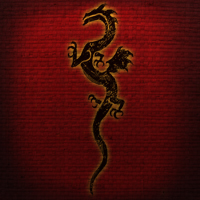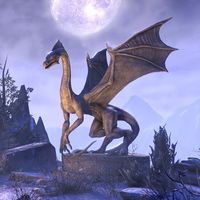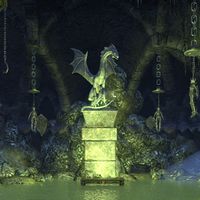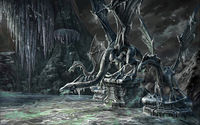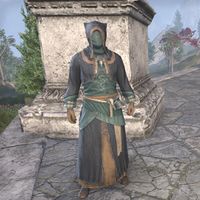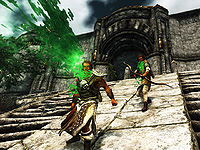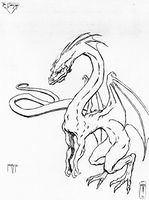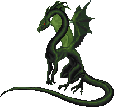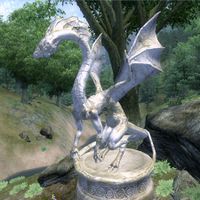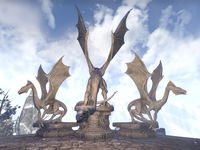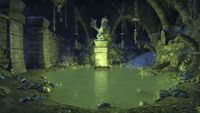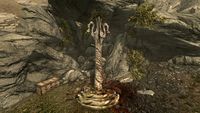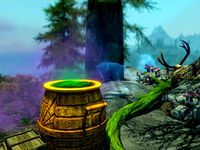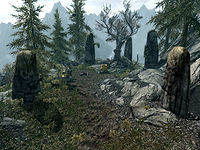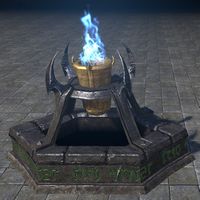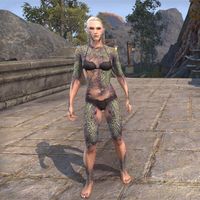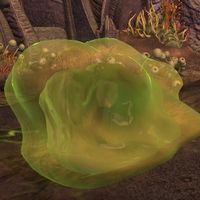Lore:Peryite
|
Peryite (listen⏵[2]) is one of the Seventeen Daedric Princes that dwell within the realm of Oblivion. As the Daedric Prince of Pestilence,[3] his sphere of influence includes tasks, natural order (not to be confused with the perfect order of Jyggalag), contamination, and pestilence.[4][5] Peryite's sphere is described as "ordering the lowest orders of Oblivion".[6] He is also known as the Daedra of Pestilence and Plague,[7] the Taskmaster,[6] the Blighted Lord,[8] Figuring father,[UOL 1] the Lord of Infection and Pestilence,[9] the Bringer of Disease and Pestilence,[10][11]:313 the Lord of the Natural Order,[3] the Master of Tasks,[12] and the Lord of Abundant Pus and Bountiful Vomit.[9] Peryite "blesses" his worshipers with diseases, and is considered one of the more destructive Princes.[13] He is typically depicted as a green four-legged dragon, and often takes on the form of one, with the likeness to Akatosh seen as some primordial and curious jest.[UOL 2] Peryite occasionally appears as ghostly apparitions of vermin, such as skeevers.[14] The coiling, snake-like dragon and the skeever are two of Peryite's most sacred symbols.[9] The Nordic goddess Kyne is said to give Peryite the spirits of skeevers when they die.[15]
Peryite is considered one of the weakest of the Princes.[4] Some unfortunate Dremora Churls and Caitiffs find themselves in the employ of the Taskmaster.[16] Peryite's summoning day is the Ninth of Rain's Hand,[17] but an incense can be created from vampire dust, one silver ingot, a deathbell flower, and a flawless ruby that will allow one to communicate with the Prince.[14] His enemies are Ebonarm, Boethiah, Vaermina, and Mephala.[18]
Peryite's breath purportedly pollutes "both cloud and pool".[19] Peryite is in charge of keeping daedrons - chaotic creatia imbued with sufficient purpose and function from the exertion of Daedric or mortal will - from causing damage in Oblivion, mainly through events known as 'realm-rips'.[20] When asked, Fa-Nuit-Hen's tutor Riparius says that "trying to keep ahead of it all keeps Peryite mighty busy, but nobody really feels sorry for him." He then goes on to say that Peryite "earned it".[20] Despite his weak reputation, his plagues have often been deemed dangerous enough to potentially wipe out all of Tamriel.[12] It is also theorized that Peryite may have been involved in the creation of the Thrassian Plague developed by the Sload.[5]
Peryite often takes a polite or formal tone when dealing with mortals.[21] Instead of reacting with rage when rejected, he keeps a cool head.[22] Rot is sometimes described by the Erabenimsun Tribe as "the touch of Peryite".[23]
History[edit]
A legend regarding the viridescent dragon frog states that the little amphibians were once a breed of giant green frogs that grew as large as Dragons. These frogs envied the Dovah's ability to fly, so they sought out Peryite and made a pact with him. The Daedric Prince granted their wish, but it came with a price. The frogs got the wings they wanted, but the size of their bodies was greatly reduced.[24]
Second Era[edit]
Some believe Peryite is responsible for the Knahaten Flu.[25] No one knows what brought the flu to Orcrest, but some natives blamed the Argonians, while others theorized that Peryite was responsible.[26] In 2E 582, a pair of Peryite worshipers sought to enter the city and gather evidence, which they could bend to claim that Peryite was responsible for the flu.[27] Nothing substantial came of the investigation, but they found a few scraps parroting the aforementioned theories.[27]
The ancient Dragon Priest, Zaan the Scalecaller, turned to worship Peryite after her Dragon Lord, Thurvokun, abandoned her.[28] Zaan was worthy enough for Peryite to grant her Spellbreaker at some point in time.[29] In 2E 582, a Peryite Cult took up residence in Scalecaller Peak. The cult worshiped Zaan and experimented with a gruesome disease in hopes of unleashing a plague.[12] They infected the creatures that inhabited the mountain with the disease. Ogres and giants were among those infected.[30] Their symptoms should have been debilitating, but the disease unintentionally made them more powerful and excessively aggressive.[12][31] Zaan and the Peryite cult were stopped by the Undaunted at the behest of Breton historian Jorvuld Davaux.[32] Following her demise, Zaan infected Jorvuld with her plague with Peryite's assistance.[32] It is unknown whether or not Davaux found the means with which to cure himself.[32]
In 2E 582, a group known as Peryite's Chosen attempted to spread the word of Peryite throughout Senchal after the Dragons were released from the Halls of Colossus.[33][27] They also had a presence in Summerset.[34] Some cultists of Peryite expressed the belief that Mehrunes Dagon's failure to take over Nirn with the power of the Four Ambitions may bring profit to their patron.[35]
Third Era[edit]
In the events leading up to the Warp in the West, an agent of the Blades contacted Peryite in search of power. The agent reminded the Prince of a mortal from the First Era, and Peryite took a shine to the agent. He had the agent slay a Vampire Ancient who had displeased him, and in return he had one of his worshippers give Spellbreaker to the agent.[22]
In 3E 433, five worshippers of Peryite performed a ritual at the Prince's hidden shrine, located along the banks of the Silverfish River in Cyrodiil. The spell was intended to summon Peryite, but instead, the souls of the worshippers were sent to the Pits, where they became trapped. The Hero of Kvatch stumbled upon the motionless bodies of the worshippers by the shrine and was tasked by Peryite to travel to a plane in the Pits and recover their souls. The plane consisted of a volcanic island inhabited by many Daedra, with a Blood Well tower and a series of volcanic caves called the Sightless Grotto. The Hero rescued the souls of the worshippers and returned them to Tamriel to earn the Prince's favor.[36]
Fourth Era[edit]
In 4E 201, Peryite tasked the Last Dragonborn with slaying Orchendor, a former priest of Peryite who had abandoned the Prince. In death, Orchendor's soul was sent to the Pits, where Peryite punished him for his disobedience.[14]
Worship[edit]
Peryite's followers preach the wonders of their Prince and the mysteries of the divine skeever.[9] Peryite's worshippers are not well known or documented, and take a variety of methods in how they worship him. The Natural Order is a cult that consists of venerable nobles and aristocrats across Tamriel who secretly worship the Taskmaster.[37] Some worshipers liken Peryite more to the pus in the wound rather than disease itself; although the pus is unpleasant, it expels foul humors and restores the blood, thereby cleaning it and restoring health.[1] Peryite is viewed as the perfect truth of order by his followers, and they worship him because "sometimes the world can only be cleansed by disease", and "cleansing" the world would bring true natural order.[1][38]
Cults such as the Diseased and Order of the Sacred Skeever are organizations of self-described social outcasts that take more extreme and controversial methods.[37] They would be glad to contract a disease and die in their own filth "as Peryite intended".[3] They see every malady as a blessing from Peryite: fungal infections, scabies, rashes, mucus-filled lungs, itchiness and irritation in all forms, and tooth decay are some of the many afflictions adored by his cultists.[9][38] These cultists seek to spread whatever illnesses they have to everyone they meet.[9] Their recruitment attempts are often unsuccessful, as many see them as imbeciles.[39]
The Scalecaller Cult viewed Nirn as a nasty imperfect world with no order or respect, and they saw other Princes as chaotic lies. They concocted an all-consuming plague to bury the world in corpses so that it would belong to Peryite, who would then bring about a new age of an ordered world without chaos.[38] This event is prophesied among various branches, who say only the most faithful followers of the Prince of Pestilence will survive.[9] An interview with Phrastus of Elinhir and Lady Cinnabar of Taneth also implies that Peryite might have had a minor presence and influence among the Dragon Cult of the Nords due to their veneration of dragon-kind.[40]
There was also a particular group known as the Afflicted that consisted of Bretons located within the Reach in 4E 201. Peryite's "blessing" for them was infection with a plague, although he also granted them some resistance to its deadly effects.[41] They had unusually bright red skin and the ability to spit poisonous vomit at their enemies, but they were eventually killed by Peryite's champion in his quest to kill their overseer, the Bosmer known as Orchendor. Originally from the town of Cul Aloue in High Rock, they were "shepherded" to the Dwemer ruin of Bthardamz.[42] Orchendor and the Afflicted were meant to stand ready, awaiting Peryite's command to cover the world with his blessing.[1] They also worshiped strange draconic totems and brewed tinctures in their worship of Peryite.[43] The Afflicted drank the solutions they brewed, which other mortals would call poisons, to "heal" themselves.[42]
Peryite, who is known as the Master of Tasks and the Lord of Order, is a revered spirit in the Reachmen pantheon that shares many characteristics with Akatosh, in pivotal ways such as being attributed to "time, rigid natural order, (and) draconic imagery". This has led to scholars concluding that there was a cultural diffusion between the early ancestors of Men and Mer in the Northwestern parts of Tamriel. To describe Peryite as a necessary evil would be a misnomer, for while the Reachfolk see him as necessary, they see the good in him maintaining a balance as a force of nature. While Reachmen may be claimed by blight or plague, they will come out of these natural tragedies healthier. This keeps the dangers of overpopulation in check and allows a new generation of Reachfolk to build immunity to what Peryite throws at them.[44]
Peryite is invoked in Ashlander rites[23] and is referred to as "Figuring father Peryite" in relation to "Mephala mother" in an obscure text which also names one of his attributes as his "Golden Order".[UOL 1] The stewards of Bal Sunnar built a temple to Peryite as their Matriarch believed he offered the most protection from the Scourge. Sacrifices would later begin that brought about unrecognizable creatures such as "Peryite's Glory", voriplasm-like blobs capable of sapping strength.[45]
Artifacts[edit]
Spellbreaker[edit]
Spellbreaker (also spelled Spell Breaker) is an ancient artifact stated to have been created on behalf of King Rourken. Some believe it to be forged by a Daedric Prince themself, but regardless of its veracity, it has become claimed by Peryite specifically. Superficially a Dwarven tower shield, it is one of the most ancient relics in Tamriel. The shield not only protects its wielder from physical damage, but also from magical attacks, by reflecting magicks, dispelling curses, or silencing any mage about to cast a spell. It is said that the shield still searches for its original owner, and will not remain the property of anyone else for long.
Scarf of the Obscene[edit]
The Scarf of the Obscene was a minor relic thought to be connected to the Daedric Prince Peryite, existing in an alternate timeline.
It was described as a deceptively beautiful garment made of silks in shades of green and golden thread. However, beneath its initial allure lay a disturbing truth. Daedric runes writhed and flickered across its surface like oil on water, imparting an unsettling and distressing effect on anyone who gazed at the scarf for too long. When worn, the Scarf transformed its wearer into a living vessel for Peryite's most potent contagions. Anyone who came within a few feet of the wearer was cursed to be infected with a variety of these diseases. Each new wearer gave rise to a unique array of afflictions, the method of which remained a mystery. Despite this, it was deemed harmless unless worn.
Other Artifacts[edit]
There are curios associated with Peryite of which little is known, such as the Bilious Censer, the Toxicruciform, and the Golden Scab. They were last known to be in Gazmod the Collector's possession.[35] Although these theories have not been validated or elaborated upon by other sources, two other artifacts attributed to Peryite (Denstagmer's Ring and the Mirror of Hard Truths) are briefly mentioned by an interviewer during the Second Era, whose information may be unreliable.[40]
The Pits[edit]
The Pits is a realm of Oblivion, created and ruled over by Peryite, the Daedric Prince of Pestilence. Here, Peryite guards the lowest orders of Oblivion.
It is unknown what the realm looks like overall. What little that has been seen of the realm resembles the Deadlands, with lava seas, volcanic islands and ruined structures. The realm is usually completely inaccessible to mortals, but there have been several exceptions.
Gallery[edit]
-
Ghostly skeevers, an aspect of Peryite (Skyrim)
Notes[edit]
- The 1st Edition of the Pocket Guide to the Empire states that Peryite's "Foundation is Falling Rock".
- According to the Summerset Isles section in Kyne's Challenge: A Hunter's Companion, an ancient shrine to Peryite on the Isles depicts Altmer fighting "slug-like creatures".
- Cut dialogue/text in Daggerfall describes Peryite as the "most affable of the Daedra Princes with the worst reputation."
See Also[edit]
- For game-specific information, see the Daggerfall, Oblivion, Skyrim, and ESO articles.
Books[edit]
- Black Kiergo: Primed for Peryite? by Yamighu — A worshipper's journal entry about Black Kiergo
- Letter to Peryite — A Daedric worshiper's letter of thanks
- Research of Nathien Mortieu, Vol. 3 by Nathien Mortieu — Research into disease in service of Peryite
References[edit]
- ^ a b c d Kesh the Clean's dialogue during The Only Cure in Skyrim
- ^ ESO Live: "Episode 1". Retrieved 2025-01-16.
- ^ a b c Marthine's dialogue in ESO
- ^ a b Skyrim Loading Screen
- ^ a b Telenger the Artificer Answers Your Questions 2 — Telenger the Artificer
- ^ a b The Book of Daedra
- ^ NPC dialogue about Peryite in Daggerfall
- ^ Afflicted's Note
- ^ a b c d e f g Filbert Cienne's dialogue in ESO
- ^ Steed of the Afflicted mount description in ESO
- ^ The Elder Scrolls V: Skyrim: Prima Official Game Guide — David Hodgson
- ^ a b c d Jorvuld Davaux's dialogue during Plans of Pestilence in ESO: Dragon Bones
- ^ On Oblivion — Morian Zenas
- ^ a b c The Only Cure quest in Skyrim
- ^ Kyne's Challenge: A Hunter's Companion: Morrowind
- ^ Lyranth the Foolkiller Answers Your Questions — Lyranth the Foolkiller
- ^ Events of Daggerfall
- ^ Oblivion Faction data in Daggerfall
- ^ Song of Despair — Anonymous
- ^ a b Lord Fa-Nuit-Hen and Tutor Riparius Answer Your Questions 2 — Fa-Nuit-Hen and Tutor Riparius
- ^ Peryite's dialogue during Peryite's Quest in Daggerfall
- ^ a b Events of Peryite's Quest in Daggerfall
- ^ a b Ritual of Appeasement
- ^ Viridescent Dragon Frog's description in ESO
- ^ Letter to Peryite
- ^ First Signs of the Flu
- ^ a b c Events of Unhealthy Preoccupation in ESO: Elsweyr
- ^ Zaan the Scalecaller's dialogue in ESO: Dragon Bones
- ^ Zaan the Scalecaller's use of Spellbreaker in ESO: Dragon Bones
- ^ Appearance of the infected giants and ogres in Scalecaller Peak in ESO: Dragon Bones
- ^ Research of Nathien Mortieu, Vol. 2 — Nathien Mortieu
- ^ a b c Events of Plans of Pestilence in ESO: Dragon Bones
- ^ Black Kiergo: Primed for Peryite? — Yamighu
- ^ Events of The Dreaming Cave in ESO
- ^ a b Eorda's dialogue in ESO
- ^ Peryite quest in Oblivion
- ^ a b Dagonists Through the Ages — Larina Hanus, scholar on Daedric cults
- ^ a b c Research of Nathien Mortieu — Nathien Mortieu
- ^ Razum-dar's dialogue in ESO
- ^ a b A Matter of Voice and Brass: Dragon Bones DLC Interview — Phrastus of Elinhir, Lady Cinnabar
- ^ Afflicted Refugee's dialogue in Skyrim
- ^ a b Unsent Afflicted Letter
- ^ Appearance of the Dragon-tipped totems deep within Bthardamz in Skyrim
- ^ Great Spirits of the Reach: Volume 4 — Vashu gra-Morga, Chief Daedrotheologist at the University of Gwylim
- ^ Journal of Adosi Fevur — Adosi Fevur
Note: The following references are considered to be unofficial sources. They are included to round off this article and may not be authoritative or conclusive.
|
||||||||
|
||||||||||||||||||||||||||||||||||||
|
|||||||||||||||||||||||
